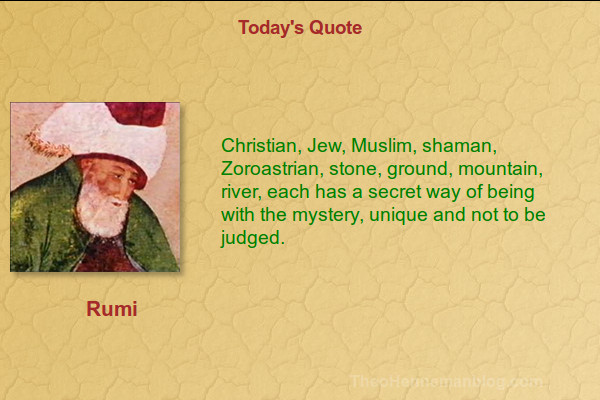Quotes
17-11-16
Rumi: Secret way of being with the mystery

Christian, Jew, Muslim, shaman, Zoroastrian, stone, ground, mountain, river, each has a secret way of being with the mystery, unique and not to be judged.
Jalāl ad-Dīn Muhammad Balkhī , also known as Jalāl ad-Dīn Muhammad Rūmī , Mawlānā or Molānā (meaning Our Master), Mawlawī or Molavi (meaning My Master), and more popularly in the English-speaking world simply as Rumi (30 September 1207 – 17 December 1273), was a 13th-century Persian poet, jurist, theologian, and Sufi mystic.Iranians, Turks, Afghans, Tajiks, and other Central Asian Muslims as well as the Muslims of South Asia have greatly appreciated his spiritual legacy in the past seven centuries. Rumi’s importance is considered to transcend national and ethnic borders. His poems have been widely translated into many of the world’s languages and transposed into various formats. He has been described as the “most popular poet in America” and the “best selling poet in the US”.
Rumi’s works are written in Persian and his Mathnawi remains one of the purest literary glories of Persia, and one of the crowning glories of the Persian language. His original works are widely read today in their original language across the Persian-speaking world (Iran, Tajikistan, Afghanistan and parts of Persian speaking Central Asia and the Caucasus) Translations of his works are very popular, most notably in Turkey, Azerbaijan, the United States and South Asia. His poetry has influenced Persian literature as well as Turkish, Punjabi, Urdu and some other Iranian, Turkic and Indic languages written in Perso-Arabic script e.g. Pashto, Ottoman Turkish, Chagatai and Sindhi.



